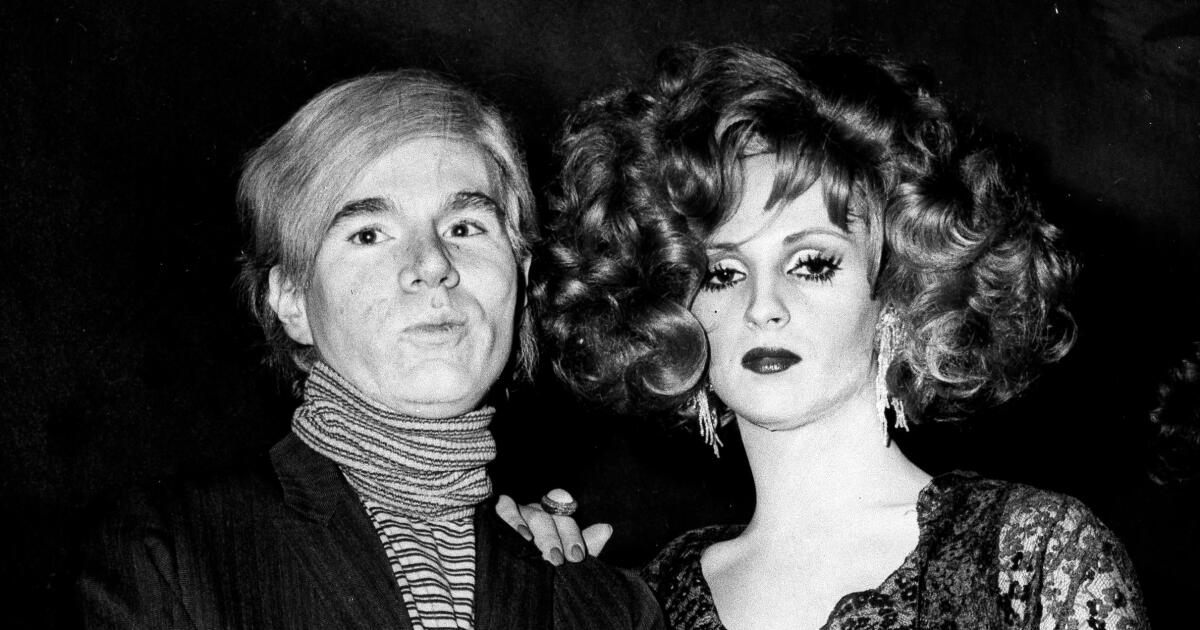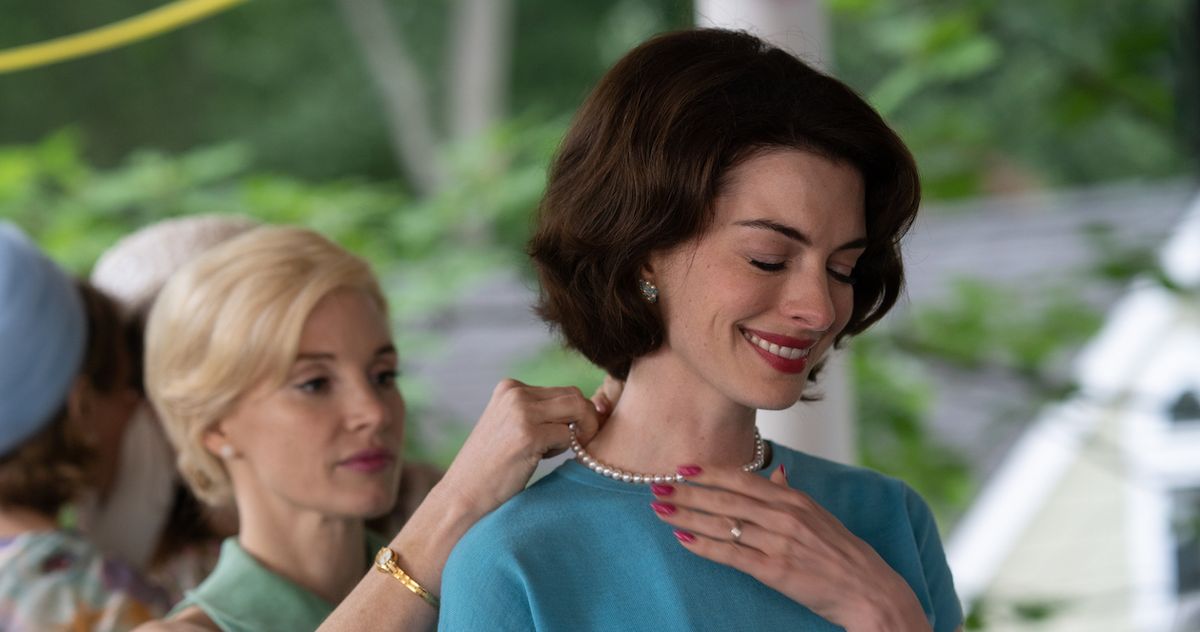Entertainment
50 years after Candy Darling's death, Warhol superstar's struggle as a trans actress still resonates

On the Shelf
Candy Darling: Dreamer, Icon, Superstar
By Cynthia Carr
FSG: 432 pages, $30
If you buy books linked on our site, The Times may earn a commission from Bookshop.org, whose fees support independent bookstores.
Warhol superstar Candy Darling is synonymous with doomed glamour — a gorgeous woman playing a dying gorgeous woman. The image of her laid up in the hospital, looking ready for her close-up in full makeup with one black rose on the pillow beside her, looks like a staged photo for a fashion magazine. But that picture, taken by Peter Hujar, is as staged as it is real. Candy Darling died of lymphoma in that hospital room in 1974. She was 29.
Candy, who was trans, lived a life ripe for biography. Her friend Jeremiah Newton set out to write her story right after her death. “He never told me why he stopped working on it,” Cynthia Carr, the author of “Candy Darling: Dreamer, Icon, Superstar,” tells The Times via email. “He did me an enormous service by interviewing some 50 people back in the 1970s and giving me the tapes.” Newton died in 2023.
Even with those materials at her disposal, “Candy Darling” has taken Carr, also the biographer of artist David Wojnarowicz, 10 years to write.
Candy’s struggle as a trans woman is the reason Carr undertook this project. One minute Candy’s in New York, on the arm of Andy Warhol; then, as Carr relates, she’s on her way home to visit her mother in Massapequa Park, Long Island, and her mother would say, “Don’t come till after dark. Don’t let anyone see you. Don’t answer the door.”
“I thought, ‘Wow, that has to be just a hint of what she went through as a trans woman back in the ’60s and early ’70s,’” Carr says. “I wanted to tell that story.”
(Farrar, Straus and Giroux)
For someone who lived such a tragically short life, Candy’s schedule was packed, and the worlds in which she traveled were diverse.
“I confess that I have never worked from an outline on any of my projects,” Carr admits. “But I start making a chronology immediately and keep filling it in as I do my research. I had the 48 tapes (and two transcripts) Jeremiah had done and the 98 people I interviewed myself — some of them multiple times. I went through old Village Voices, page by page, starting in 1967, when Candy appeared in her first play, until her death early in 1974. At that time, the Voice was the most essential and sometimes the only publication covering early Off Off Broadway, early gay liberation and the beginnings of second-wave feminism.” Carr’s research on Candy’s theater career is thrilling. It reveals a talented actress with whom directors were keen to work — more than “up-and-coming,” they describe Candy as brilliant.
Would Candy have had a future in Hollywood, had she lived longer? “Candy definitely wanted to make it in Hollywood but had more than a glass ceiling to deal with,” Carr says. “She would have had to live for quite a while — till now, say — to be accepted.”
In fact, a Candy biopic has long been in the works, and it’s now finally in the filming stage, starring trans actress Hari Nef. Nef’s casting is an answer of sorts to the controversy of cis actors playing trans characters. “I assume they’re basing the film on the documentary ‘Beautiful Darling,’ which really focuses on [Candy’s relationship with Newton],” Carr says. “As for the casting, a trans woman should play Candy.”
Despite Candy’s celebrity in those worlds, the gulf between her experience as Candy Darling and in her family also is reflected in her archive. Some of her personal papers, including diaries and letters, ended up in the Warhol Museum in Pittsburgh, Carr says, but most are lost. Newton held on to many of the boxes of Candy’s things as long as he could, but when he was hospitalized, Carr says, “I’m sure some of them went into a dumpster.
“Writing a biography is a search for puzzle pieces,” Carr says, and sadly, other than Newton, Candy didn’t have a family member or a designated person to protect and ensure her legacy.
Candy was also poor — and unhoused. There was her mother’s house in Long Island to return to, which was not ideal, given the stigma and bigotry of the time. Candy mostly relied on friends and acquaintances, crashing in different places from night to night, week to week. Warhol lent her money and even paid for some of her hormone treatments. But Candy didn’t really have a home. As Carr writes: “Her life was not boring, but poverty and illness are boring.”

Author Cynthia Carr says her new book, “Candy Darling: Dreamer, Icon, Superstar,” is dedicated to the trans community.
(Timothy Greenfield-Sanders)
It was the hormones that most likely resulted in Candy’s cancer diagnosis and, ultimately, her death.
“I wish I could have seen a death certificate. According to Jeremiah, the doctor said it was lymphoma. Jeremiah also said that she’d been taking hormones that were later found to be carcinogenic and were taken off the market. I spent probably too much time trying to corroborate that,” Carr says. “What hormones were people taking in the early ’70s? Which one (or more) were taken off the market? I read a book on trans medicine, talked to a couple of doctors and combed through the internet, but we’re talking about a drug that would have been recalled almost 50 years ago. I never managed to figure it out. But, yes, it was the consensus at the time that hormones had caused her cancer.”
Though hormone therapy and gender-affirming healthcare have improved, the conditions in which trans people live in this country, and the violence they face, both from individuals and their own government, are still dire.
“I started work on this book in 2013, and transgender people have become much more visible in mainstream culture since then,” Carr says. “They’ve also become big targets for far-right politicians, and I can’t overstate how alarming this is. There’s so much anti-trans legislation out there it’s hard to even keep track of it — literally hundreds of bills coming up around the country. Bans on gender-affirming care, on participation in school sports, on using a bathroom that aligns with your identity and so on. Much of that’s aimed at young people, but it won’t end there. There’s an overall goal to erase transgender rights.”
“Candy Darling” is dedicated to the trans community. “May this account of one life make a difference,” Carr writes in the book’s dedication. “May you be understood. May you be appreciated. May you be loved.”
The point of any story is to relate a message — one that could, in the end, help others feel less alone. Literature is also one of the few ways we have to understand another human being — to place ourselves in the mind and experience of someone different from us.
Candy wanted to live and to be loved, to become a woman, to have a family, to have a home. “The word ‘trans’ implies a journey,” Carr writes. Candy’s journey, and the journey of trans people, continues.

Movie Reviews
What If Jessica Chastain and Anne Hathaway Had a Mother-Off, and We All Lost?

The strange case of Mothers’ Instinct.
Photo: Neon
There’s a new movie starring Jessica Chastain and Anne Hathaway out this week, which is normally the sort of thing you’d expect to have heard about. But, after its release in the U.K. months ago, Mothers’ Instinct is slipping into U.S. theaters with as little splash as an Olympic diver nailing a triple somersault tuck. The film, a thriller directed by Benoît Delhomme, is getting the treatment typically reserved for a disaster, which is a shame, because I’ve been dying to discuss it with someone, and that’s hard when no one has any idea what you’re on about. Mothers’ Instinct is, indeed, pretty terrible, and not in the so-bad-it’s-good sense, and yet there’s something strangely moving about it. It’s a poignant example of how what looks like rich material to actors can turn out to be lousy material for audiences. Mothers’ Instinct is a remake of a 2018 Belgian film adapted from a novel by Barbara Abel, and watching it, you can appreciate exactly why these two major actors signed on to star in it. Funnily enough, those same qualities go a long way toward explaining why the movie doesn’t work.
Mothers’ Instinct isn’t camp, but it’s close enough that if you squint, you can almost see a version of the film that tips into something broader. Of course, if you squint, you wouldn’t be able to appreciate how immaculately Chastain and Hathaway are costumed. They look incredible — not like two 1960s housewives, which is what they’re playing, so much as two people who keep switching outfits because they can’t decide what to wear to the high-end Mad Men–themed party they’re headed to later. As Alice, Chastain is styled like a Hitchcock blonde in pin-curled ash updos and cardigan sets, while as Alice’s neighbor and friend Céline, Hathaway is given a Jackie O. look that involves a shoulder-length bouffant, pillbox hats, and gloves. They’re cosplayers in a gorgeous, airless setting, adjoining houses on a street that might as well be floating in space, the husbands (played by Anders Danielsen Lie and Josh Charles) vanishing to work for long stretches. The artificiality of this intensely manicured re-creation isn’t to any particular end, which gives the whole movie the air of a Don’t Worry Darling situation in which no one ever wakes up to the twist, instead sleepwalking through a stylized dream of Americana.
In fact, while Alice is restless over having given up her job as a journalist to take care of her son Theo (Eamon O’Connell), and Céline gets ostracized by the community after the death of her son, Max (Baylen D. Bielitz), Mothers’ Instinct isn’t actually all that interested in the pressures of living under a repressive 1960s patriarchy. Instead, it’s about another time-tested theme, one that’s best summed up as: Bitches be crazy. The perfect sheen of its surfaces — Delhomme, who’s making his directorial debut, is a cinematographer who started his career with The Scent of Green Papaya and has since worked with everyone from Tsai Ming-liang to Anton Corbijn — is paired with a score that shrieks unease from the opening scene, in which Céline is thrown a surprise birthday party. The source of this suspense isn’t revealed until later, after Max takes an unintended swan dive off the porch and the women’s friendship is threatened by grief, guilt, and suspicion. Is Céline in mourning, or does she actually irrationally blame Alice for what happened while developing an alarming fixation on Theo? Is Alice right to be suspicious of her bestie, who’s unable to have another baby, or is she being paranoid because the mental illness that previously resulted in her hospitalization has returned? Is it odd that two feminist actors jumped to participate in a film that traffics so freely in unexamined stereotypes about women and hysteria?
Not, it seems, when the opportunities to stare coldly into space or look on in glassy betrayal are this good. I’m not trying to sound snide here — the characters in Mothers’ Instinct have no convincing inner lives at all, but the exterior work of the actors playing them is choice stuff. When Alice and Céline are getting along, Chastain and Hathaway nuzzle together supportively like long-necked swans. When things start to go south, Chastain opts for an aloof distance with stricken eyes, while Hathaway prefers a labored smile that drops as soon as she’s alone. Theirs is a brittle-off no one can win, but both try their hardest anyway. The effort reaches its crescendo at Max’s funeral, where Hathaway’s enormous eyes glimmer through the barrier of a black lace veil and Chastain tilts her face up so that the elegant tracks of past tears can gleam in the light. The scene ends with Céline collapsing in anguish while Alice rushes her tantrumming child out of the church, an explosion of drama that would be so much more effective if the movie had left any room for modulation instead of starting at 10 and staying there. Mothers’ Instinct gets much sillier before it ends, but given how little it establishes as its baseline tone, it doesn’t feel fair to say it goes off the rails. Rather, as Hathaway stares brokenly into the dark and Chastain tears apart her nightstand drawer in panic, what comes to mind is how great a set of GIFs this movie will make someday. That’s not much, but I guess it’s something?
See All
Entertainment
Tyler Perry calls out 'highbrow' critics, defends his fans: 'Don't discount these people'

Tyler Perry’s last feature film earned a rare 0% on Rotten Tomatoes — a point that’s apparently of little concern to him.
The billionaire filmmaker, best known for his franchise character Madea, is far more interested in the opinions of his fans than those of “highbrow” critics, he said on the “Baby, This is Keke Palmer” podcast.
“For everyone who is a critic,” Perry said in the Tuesday episode, “I have thousands of — used to be — emails from people saying: ‘This changed my life. Oh, my God, you know me. Oh, my God, you saw me. How did you know this about my life and my family?’ So that is what is important.”
Critiques of Perry and his purportedly flat depictions of Black characters date back to his early directing days. Spike Lee, for one, in 2009 famously alluded to Perry’s work while complaining about the “buffoonery” in Black comedy. More recently, playwright Michael R. Jackson took his turn swinging at the movie mogul in his metafictional musical “A Strange Loop.”
In the number “Tyler Perry Writes Real Life,” Jackson’s protagonist — a Broadway usher who dreams of being a writer — denounces Perry’s oeuvre: “The crap he puts on stage, film and TV / Makes my bile want to rise!”
The song wasn’t born of any “personal vendetta,” Jackson told Washington Post Live in 2022. “It’s really about actually taking Tyler Perry’s work very seriously, because it’s often held up, often by Black communities, as sort of, like, the end-all-be-all of what one can do as a Black artist.”
“I just wanted to sort of problematize that and satirize that,” he said.
Upon Palmer referencing Jackson’s musical jab, Perry told the podcast host, “I know for a fact that what I’m doing is exactly what I’m supposed to be doing.”
When it comes to critics in general, he continued, it’s best to “drown all that out.”
“We’re talking [about] a large portion of my fans who are disenfranchised, who cannot get in the Volvo and go to therapy on the weekend,” he said. “So you’ve got this [Black critic] who is all up in the air with his nose up looking at everything, and then you’ve got people like where I come from, and me, who are grinders, who really know what it’s like, whose mothers were caregivers for white kids, and were maids and housekeepers.”
He added: “Don’t discount these people and say that their stories don’t matter. Who are you to be able to say which Black story is important or should be told? Get out of here with that bull-.”
Corey Hardict, who co-stars in Perry’s latest film “Divorce in the Black,” last week invoked a similar defense for the critical bomb: “I mean, the people love the movie and we do it for the people — that’s who I do it for. If the culture’s rocking with it, it’s all love. So it’s fine.”
Perry’s podcast comments have already garnered backlash online, with Preston Mitchum of the reality show “Summer House: Martha’s Vineyard” writing Wednesday on X, “Yes, because writing and producing a movie where a Black woman from a small town cheated on her husband, acquired HIV, then ended up physically disabled is absolutely the groundbreaking Black story we need to see.”
Mitchum’s post seemingly refers to Perry’s 2013 film, “Temptation: Confessions of a Marriage Counselor.”
Palmer defended Perry against other disparagers online, writing Wednesday on X, “The enemy isn’t Tyler it’s the system that makes it hard for multiple black artist[s] to shine at one time.”
“Tyler is not the gatekeeper of all black stories he’s just one creative who broke through the system,” she wrote. “Advocating for others to do the same is the fight, not hating Tyler for his work that many do love.”
Perry in 2019 celebrated the grand opening of his 330-acre Tyler Perry Studios in Atlanta. He created the complex with the hope of promoting cultural diversity in the film industry, he told The Times in 2016.
“Sometimes I drive around here by myself and think, ‘Is this too much, or is this what I’m supposed to do?’ ” Perry said. “The answer is obvious. When this fell into my lap, I said, ‘I have to do this.’ This is the endgame.”
Movie Reviews
Movie Review: Twisters – Kenbridge Victoria Dispatch

Movie Review: Twisters
Published 11:15 am Friday, July 26, 2024
1 of 3
Let me immediately cut to the chase (pun intended) and answer the question you’re all wondering. TWISTERS is a fun and entertaining summer blockbuster, but it in no way holds a candle to its predecessor TWISTER (1996). Still, the CGI is intense, the sound design is loud and immersive, and the lead performances — especially from Glen Powell — are sure to wow.
Following a horrible tragedy, meteorologist Kate Carter (Daisy Edgar-Jones) has spent years out of the storm chasing business. She now lives in the largely tornado-less New York City, using her innate understanding of storm systems to direct weather alerts. But when her old friend Javi (Anthony Ramos) begs her to join his privately-funded start-up, which is designed to use military-grade radars to learn more about tornadoes and save communities in Oklahoma, she agrees to give him a week of her time. It’s not too long before “tornado wrangler” influencer Tyler Owens (Glen Powell) enters the scene with his ragtag group of weather enthusiasts, creating a competition between scientific research and entertainment. Each group races to be the first on the scene, with Kate and Javi seeking to model the tornado and Tyler trying to get the most likes on social media. But can the two groups find a way to work together or will the competition be more vicious than the tornadoes?
I am admittedly judging myself for caring too much about a summer blockbuster’s plot, because that’s not really what any of us sign up for with these films. But the various encounters with tornadoes begins to feel slightly repetitive and creates pacing issues, making a two-hour film feel like its runtime. And for some reason, it seems like there is something missing when it comes to portraying the sheer terror of experiencing F5 tornadoes, unlike the original film; the main set pieces were not as memorable.
The film does little to make you care about whether the characters live or die, relying on Glen Powell and Daisy Edgar-Jones’s chemistry and natural charisma to do the heavy lifting. The second Powell steps out of his gigantic truck, with his cowboy hat and belt buckle sparkling in the sun… sorry, I just lost my train of thought… and that’s what TWISTERS is hoping. Powell’s magnetism is sure to knock you off your feet and distract you from the film’s middling plot. And while Edgar-Jones’s performance is more muted, due to her character’s battle with PTSD, she brings an important level of humanity to the film and a character to both see yourself in and root for. More than that, her chemistry with Powell is off the charts and will certainly leave you wanting their relationship explored more in a sequel. The supporting characters are not given much to work with and as such, don’t really engender much concern when they are in deadly situations.
One element of TWISTERS I liked more than TWISTER is it showed the emotional and financial toll tornadoes ravage on communities. Of course, that is an element of the first film, but TWISTERS does a great job showcasing the speed in which tornadoes can overtake and devastate a community, both in loss of life and loss of property. This, juxtaposed with the “fun” in chasing storms brings a real human element to the film. I also want to give a shoutout to the movie not having any sad animal scenes (apart from a possible run-in with a chicken). So for all of you sickos excited to see another flying cow, this isn’t for you.
TWISTERS is the exact kind of movie you need to see in a theater so you can get the full experience. Where else can you admire the cinematography, get immersed in the sound design, and lose yourself in Glen Powell’s cowboy hat and million dollar smile? I saw it in a Dolby theater and was blown away.
There is no end credit scene.
My Review: B
-

 World1 week ago
World1 week agoOne dead after car crashes into restaurant in Paris
-

 Midwest1 week ago
Midwest1 week agoMichigan rep posts video response to Stephen Colbert's joke about his RNC speech: 'Touché'
-

 News1 week ago
News1 week agoVideo: Young Republicans on Why Their Party Isn’t Reaching Gen Z (And What They Can Do About It)
-

 Movie Reviews1 week ago
Movie Reviews1 week agoMovie Review: A new generation drives into the storm in rousing ‘Twisters’
-

 News1 week ago
News1 week agoIn Milwaukee, Black Voters Struggle to Find a Home With Either Party
-

 Politics1 week ago
Politics1 week agoFox News Politics: The Call is Coming from Inside the House
-

 News1 week ago
News1 week agoVideo: J.D. Vance Accepts Vice-Presidential Nomination
-

 World1 week ago
World1 week agoTrump to take RNC stage for first speech since assassination attempt

















